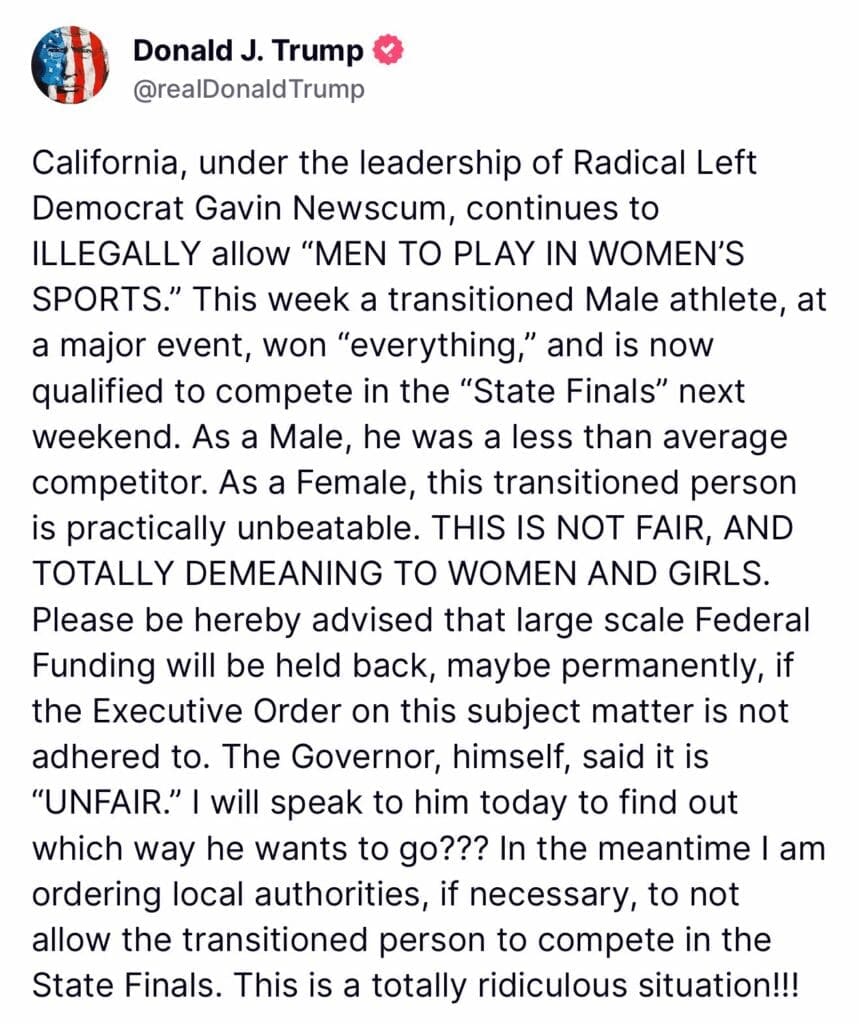California Governor Gavin Newsom expressed support Tuesday for a newly announced policy by the California Interscholastic Federation (CIF) that expands eligibility for high school athletes competing in the upcoming state track and field championships. The decision follows controversy surrounding a transgender student-athlete whose recent success drew national attention and backlash.
The athlete, a transgender girl from Riverside County, had qualified for the state championships in the long jump and triple jump after placing first in regional competitions earlier this month. Her performance was quickly politicized by former President Donald Trump, who posted a statement condemning her participation and threatened to withhold federal funding from California if the state failed to block what he referred to as “male competitive participation in women’s sports.”

In response, the CIF unveiled a new “pilot entry process,” which expands the roster of eligible athletes by allowing the first non-qualifying competitor in each event, specifically, athletes assigned female at birth who just missed the cutoff, to also participate in the state meet. The CIF did not directly cite Trump’s comments or the transgender athlete at the center of the issue, and it remains unclear whether the program will extend beyond this year.
“The CIF believes this pilot entry process achieves the participation opportunities we seek to afford our student-athletes,” the organization said in a statement.
Governor Newsom, while acknowledging the complexity of the issue, praised the CIF’s response. “CIF’s proposed pilot is a reasonable, respectful way to navigate a complex issue without compromising competitive fairness,” said Izzy Gardon, a spokesperson for the governor. “The Governor is encouraged by this thoughtful approach.”
The transgender athlete will still be permitted to compete under existing CIF policy and California state law, which affirms that students have the right to participate in sports consistent with their gender identity. Jacquie Paul, a spokesperson for the Jurupa Unified School District where the student attends, emphasized that the district remains committed to upholding these protections.
“Both state law and CIF policy currently require that students be permitted to participate in athletic teams and competitions consistent with their gender identity, irrespective of the gender listed on the pupil’s records,” Paul said. “We remain committed to following the law as written and ensuring that all students are granted the rights afforded to them in a safe and welcoming environment.”
The federal government has launched an investigation into CIF’s practices under the Trump administration’s renewed focus on restricting transgender participation in school athletics. The executive order cited by Trump outlines a broad opposition to transgender inclusion in women’s sports, citing “fairness, dignity, and truth” as guiding principles.
Inside the state, reactions have been mixed. Some Republican officials have criticized the CIF’s decision as insufficient. Sonja Shaw, president of the Chino Valley school board and a candidate for state superintendent, said the policy change was “nothing more than damage control after letting males dominate girls’ events.” Others, however, see the change as a partial step toward protecting all student-athletes’ opportunities.
For many transgender students, their families, and their allies, this moment is deeply personal. Sports are not only about competition but also about identity, self-worth, and belonging. The continued scrutiny of transgender youth, especially in adolescence, can have profound effects on mental health and school engagement. Transgender athletes, like their peers, seek the chance to play, to succeed, and to be treated with dignity.
While the CIF’s pilot policy has created a wider path for inclusion without altering existing protections, many advocates warn that these conversations must center the humanity of the students involved. They are not political pawns; they are kids trying to run their race.
As this policy unfolds and legal challenges loom, California finds itself once again at the intersection of equity and politics. But for now, one thing remains certain: transgender students in California remain legally protected in their right to participate, and that right still stands.


